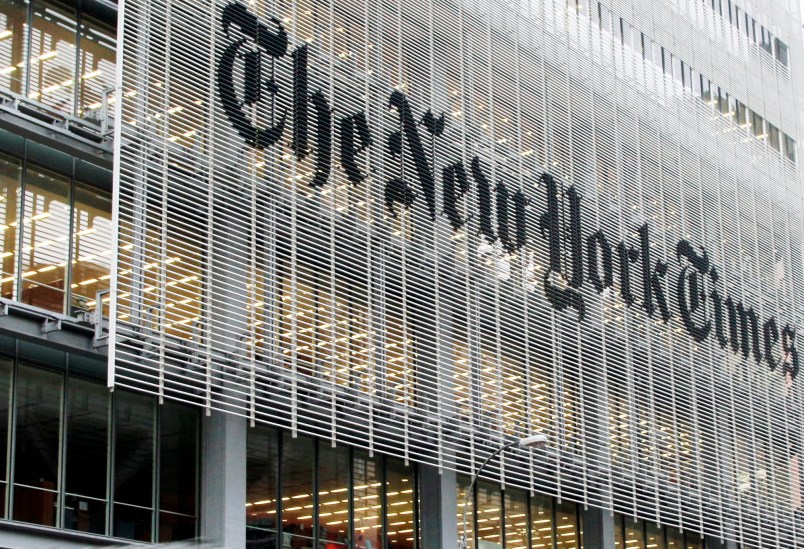New York Times public editor Margaret Sullivan wrote in a column Friday that the newspaper will be reviewing its vetting process for using anonymous sources after an article incorrectly characterized the social media activity of one of the San Bernardino shooters.
Sullivan harshly condemned the piece as a “failure of sufficient skepticism at every level of the reporting and editing process.”
The Times added a three-paragraph editor’s note late Thursday night to an article sourced from anonymous law enforcement officials who said San Bernardino shooter Tashfeen Malik “talked openly on social media” about her radicalism. FBI director James Comey had challenged that information in a Wednesday press conference, insisting that Malik and her husband Syed Rizwan Farook instead discussed their plans to commit jihad in private online messages.
Asked how the Times could have gotten that crucial distinction wrong, executive editor Dean Baquet told Sullivan that the sources “misunderstood how social media works” and apparently did not know the difference between public and private messages on social media.
President Barack Obama said in a Friday press conference that intelligence agencies are “constantly monitoring public posts” but that it is “by definition” harder to track suspects’ private exchanges. His administration came under fire this week for not having a more rigorous social media review in the vetting process for visa applicants and, by extension, failing to prevent the mass shooting, which left 14 people dead.
Baquet told Sullivan that the Times would immediately begin determining new procedures to deal with anonymous sources, calling the lapse a “system failure that we have to fix.” Although Baquet insisted that the paper would not stop using anonymous sources, Sullivan wrote pointedly in her article that “too many Times articles do.”
“The paper needs to show far more skepticism—a kind of prosecutorial scrutiny—at every level of the process,” Sullivan wrote. “Two front-page, anonymously sourced stories in a few months have required editors’ notes that corrected key elements – elements that were integral enough to form the basis of the headlines in both cases. That’s not acceptable for Times readers or for the paper’s credibility, which is its most precious asset.”
In July, the Times came under fire for incorrectly alleging that Democratic presidential candidate Hillary Clinton was the subject of a criminal inquiry into her use of a private email account during her time as secretary of state. The paper issued two corrections and a lengthy editor’s note regarding the error.







Various Fox News personalities will likely rush to assert Obama coerced the Times into their faux retraction, under threat of whatever.
If the NYT had been more scrupulous about anonymous sourcing and outing deliberate obfuscaters, perhaps the Bush-Cheney Iraq War could have been averted. (Although Colin Powell would probably have also had to grow some balls and publicly tell the world he was asked to lie, too.) Remember when the NYT refused to use the word ‘torture’ because…well, I forget why exactly, other than Ed. Bill Keller thought the word was ambiguous, loaded, and controversial. I always thought his pusillanimous logic was torturous. Even so, the NYT is still an unparalleled US paper.
They couldn’t have used the google machine to learn about public and private messages in the internets? I heard Malik poked her husband with an octopus on the Facebook thing.
NYT deserves the scorn it’s getting.
But even if these statements were public and not private, it seems to me quite a stretch to imagine that the Feds could have stopped what happened in San Bernadino. Do we really think they can monitor every single post on Facebook, Google+, twitter, and the umpteen other social networking services out there? And do something every time someone uses the word “jihad”?
This attack smacks of opportunism rather than a genuine concern for the security of Americans.
[quote=“agio, post:5, topic:30356”]
But even if these statements were public and not private, it seems to me quite a stretch to imagine that the Feds could have stopped what happened in San Bernadino
[/quote]Yes - and the outrage if the federal government were reading FB postings of an ordinary American citizen without legally-sanctioned provocation. Admit it - this is a thorny issue and requires thoughtful discussion.